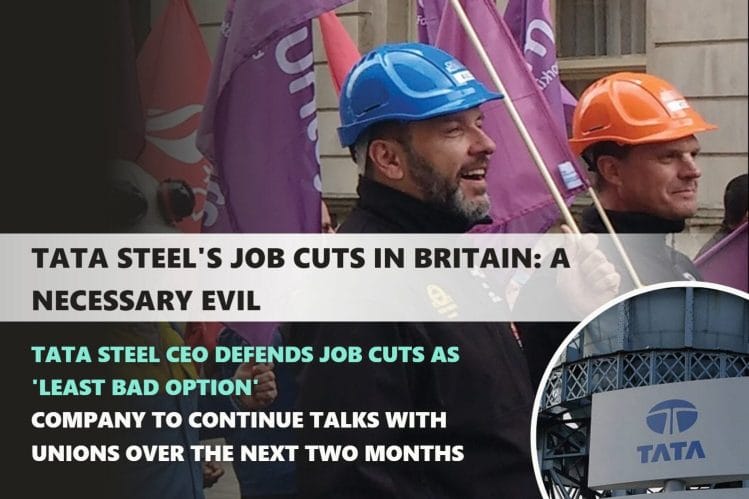Tata Steel’s planned job cuts in Britain have been described as the ‘least bad option’ by the company’s CEO, T V Narendran. The decision, which will see the closure of two blast furnaces and the loss of up to 2,800 jobs, has been met with resistance from trade unions.
Is there a silver lining to the dark clouds hanging over Britain’s steel industry? Amidst the sobering announcement of impending job cuts by Tata Steel, the situation illuminates the stark realities faced by the global steel sector. Tata Steel is set to close its two blast furnaces in Britain by the end of this year, leading to thousands job losses at the Port Talbot steelworks in Wales.
While this move has been dubbed the “least bad option” by CEO T.V. Narendran, it has sparked resistance from trade unions with threats of industrial action—a standoff that underscores the challenges of operating in an industry battling financial headwinds.

The decision to downsize comes amid the company’s financial distress, as emphasized by Narendran, who pointed out the need for a “necessary conversation.” It is clear that this is not a knee-jerk reaction; rather, it is a considered move backed by the somber reality that the business is hemorrhaging funds. These are tough times indeed for the employees and the local economy, but Tata Steel’s management suggests this restructuring could be a pivotal step toward sustainability.
Read: Microsoft Slashes 1900 Jobs Across Xbox, Activision Units
In a broader context, the narrative is juxtaposed against the backdrop of India’s aggressive pursuit of critical minerals, with an ongoing auction that’s expected to draw around $5.4 billion across various resources, including lithium. This strategic move, as per Narendran’s statement, indicates the steel giant’s forward-thinking approach, surveying potential opportunities that could ensure its competitive edge in the future.
Despite the upheavals in Britain, Tata Steel remains optimistic about the demand for steel within India, expecting it to surge across multiple sectors including automotive, construction, and infrastructure. This contrasts sharply with the European scenario, where market conditions are forcing tough decisions.
The story of Tata Steel’s restructuring is complex and fraught with both risk and potential. The company’s leaders tread a fine line between managing current losses and investing in future gains, a juggling act that reflects the volatile nature of the steel industry at large.
Fluctuations in the price of coking coal, a critical raw material in steelmaking, continue to add to the volatility, with prices expected to swing between $270-$350 per ton. Such unpredictability further exacerbates the challenges faced by steel manufacturers, requiring them to adopt flexible strategies to mitigate risk.
In situations like these, it’s essential to look beyond the immediate turbulence and consider what innovative strategies and policies can be implemented to future-proof an industry that’s crucial to economic development.
In light of the unfolding drama in Britain’s steel sector and the forward-looking strategies of Tata Steel in India, the following are our independent recommendations that offer a glimpse into a possible path forward:
- Diversification as a Safety Net: Stakeholders in the steel industry should consider diversifying their interests, tapping into markets where demand is growing, such as India’s booming infrastructure sector.
- Investing in the Future: Pursuit of critical minerals such as lithium should be intensified, as they are likely to be the cornerstone of burgeoning industries like electric vehicles.
- Creating a Flexible Workforce: To mitigate job losses, retraining initiatives could be ramped up, equipping workers with the skills needed for the jobs of tomorrow.
- Dialogue and Collaboration: Continuous engagement with trade unions through transparent dialogue can foster better understanding and collaborative strategies for managing restructuring.
- Leveraging Technology: Embracing technological innovation can improve efficiency and reduce costs, making operations more sustainable in the long run.
- Policy Advocacy: There is a need for advocacy for policies that support the steel industry, such as tariffs on imports or subsidies for domestic production.
As we chart the tumultuous waters of the steel industry, it’s evident that the road ahead is best navigated through a combination of strategic foresight, adaptive management, and cooperative efforts. Industry players and policymakers alike must be committed to fostering an environment where innovation thrives, and where the workforce is prepared for the inevitable shifts of a dynamic global economy.
The path forward will not be easy, but with informed strategies, a spirit of innovation, and an eye towards sustainable growth, the steel industry can emerge stronger and more resilient than ever.
What’s your take on this? Let’s know about your thoughts in the comments below!













